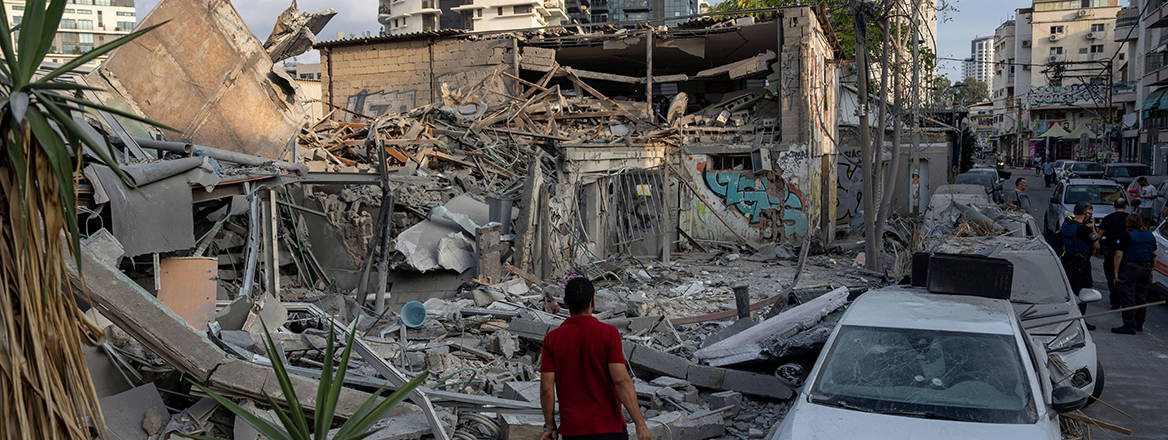Israel and the Palestinians: A New Kind of Conflict
Nothing will be the same after the weekend’s carnage in Israel. The Palestinian question is back on the agenda, and with a vengeance. So will be Israel’s response.
On Saturday, 7 October, Hamas launched an unprecedented surprise attack on Israel. Under a barrage of thousands of rockets fired from Gaza, hundreds of Hamas fighters managed to cross the heavily guarded border into Israel. They were able to briefly take over parts of Israeli towns – most notably Sderot – and military positions. An as yet unknown number of Israeli civilians and military personnel, possibly in the dozens, were taken hostage and transferred to Gaza; by Monday morning more than 700 Israelis and more than 400 Palestinians had been killed. Hours after the beginning of the attack, Israeli Prime Minister Benjamin Netanyahu declared: ‘Citizens of Israel, we are at war. Not an operation, not a round [of fighting,] at war.’
The attack must have been planned for months. Even as chaos of the Saturday morning assault is still unfolding, Hamas social media outlets have published apparently professionally produced footage of militants using paragliders to fly into Israel, and later of drones dropping grenades onto tanks and positions of the Israeli Defense Forces (IDF). The date for the launch of the attack also does not appear to be accidental coming as Israelis marked the Jewish holiday of Shemini Atzeret. It also came exactly 50 years and a day after Egypt and Syria launched the Yom Kippur War, also known as the October War, against Israel on 6 October 1973. While the eventual scale of this current conflagration is still unclear, 7 October seems certain to become another infamous turning point in the Palestinian-Israeli conflict, and possibly for the wider geopolitics of the Middle East.
The violence unleashed by Hamas this weekend will continue for weeks to come, and its full implications will take months to become apparent. An escalation of this scale was not on anyone’s radar – including Israeli intelligence – so it is prudent to be cautious with definitive conclusions about what this will mean. But there are a few early assumptions that can be made, including with regards to the conflict between Israel and the Palestinians, the ongoing speculations about a potential agreement between Israel and Saudi Arabia to normalise relations and the trend towards de-escalation and rapprochement that has prevailed in the region for the past three years.
A New Phase of Palestinian-Israeli Conflict
Hamas’ attack on Saturday morning was unprecedented in its sophistication and ferocity, and Israel’s response will likely far exceed any previous operations carried out by the IDF in Gaza over the past two decades. This is not simply a continuation, or even an intensification, of the already high levels of tensions and violence between Israel and Palestinian factions in Gaza and – especially – the West Bank over the past two years. This war opens a new chapter in the Palestinian-Israeli conflict. It is too early to compare it to the Intifadas of the late 1980s and early 2000s, but it certainly seems to have the potential to be as significant.
Once the fighting eventually settles, serious questions will be asked about how a Hamas surprise attack of this scale could have been possible, leaving Prime Minister Netanyahu and his government vulnerable
One key question in this regard is whether the violence will primarily remain contained in and around Gaza, or whether it will spread to the West Bank (thus far, there have been several deadly clashes, but nothing of the scale of what has been happening in Gaza and southern Israel). Moreover, it is also still unclear whether the Lebanese Hezbollah will fully intervene; thus far it has only rhetorically expressed solidarity with Hamas and launched seemingly intentionally limited drone attacks on the disputed Shebaa Farms in the Golan Heights, resulting in limited Israeli artillery strikes into southern Lebanon. In short, an expansion of the war is not inevitable, but certainly a possibility.
In Israel, this weekend’s attack and the war that now follows will shape politics going forward. Initially, there is likely to be a rallying-around-the-flag effect with the deep divisions that have characterised Israeli domestic politics for the past year fading into the background. However, once the fighting eventually settles, serious questions will be asked about how a Hamas surprise attack of this scale could have been possible, leaving Prime Minister Netanyahu and his government vulnerable. In fact, while he will probably remain in office for as long as this war takes, Netanyahu’s political career may well be finished; upended not by his legal troubles, but by having what looks to be one of the most catastrophic breakdowns of security in Israel happen on his watch. He may well have to follow in the footsteps of Golda Meir and Menachem Begin. Both built reputations as staunch security-first prime ministers but were ousted after major perceived security and military failures – the Yom Kippur War and the botched Lebanon invasion in the early 1980s, respectively. At the same time, the brutality of the attack, and especially Hamas’ killing and kidnapping of many civilians, including women and children, could well bolster the positions of those with the most uncompromising stands vis-à-vis the Palestinians, including Netanyahu’s right-wing coalition allies.
On the Palestinian side, meanwhile, the attack has once again exposed the ineffectiveness and fecklessness of the Palestinian Authority (PA) under aging President Mahmoud Abbas. If the PA has already struggled – and woefully failed – to assert itself meaningfully as the leadership of the Palestinian people in recent years, especially in the West Bank, this weekend’s attack has exposed it as little more than a powerless bystander. The debate about the future of the Palestinian leadership will continue until Abbas vacates his position, but for the moment all the initiative clearly belongs to Hamas and other militant factions.
The perhaps most important early takeaway from this weekend – and certainly one that the UK and other Western governments concerned about stability in the Middle East must heed – is that the Palestinian-Israeli conflict still matters and cannot be relegated to the status of a permanent but ultimately manageable feature of regional politics as has arguably been the case in recent years. Hamas’ attack and the war that now rages is primarily about Israel and the Palestinian territories. This escalation of violence will make finding a way to make progress towards a sustainable resolution of the Palestinian-Israeli conflict even more difficult. But it also highlights that ignoring it is something no one can afford – least of all the Israelis and Palestinians, but also not policymakers in London, Washington or European capitals.
Nevertheless, this new phase in the Palestinian-Israeli conflict is also likely to have repercussions for wider regional dynamics.
A Setback for Arab-Israeli Normalisation
Much early commentary in the immediate aftermath of Hamas’ attack has focused on what this means for the prospects of further normalisation of relations agreements between Israel and Arab states, especially between Israel and Saudi Arabia. Some have even suggested that the attack was Hamas’ – and by extension its supporter Iran’s – way to sabotage Israeli-Saudi normalisation talks. Although statements by leaders of Hezbollah and Palestinian Islamic Jihad warning Arab states not to engage with Israel obviously fuel such analysis, it is far too simplistic. It risks overlooking the fact that the Palestinian-Israeli conflict, more so than regional politics, is the root cause of the violence, as noted above.
Hamas’ attack this weekend has dramatically highlighted the fundamental flaw in the de-escalation and rapprochement narrative about dynamics in the Middle East that has taken hold in many Western capitals over the past couple of years
Still, this weekend’s events will have an impact. In the long-term, Saudi-Israeli normalisation remains likely – the shared strategic interests that have driven the talks to date (and the engagement between the Gulf Arab states and Israel, more generally) will remain unchanged. That said, the obstacles for a Saudi-Israeli agreement are now greater than they were a week ago. Whether or not Netanyahu’s government would be willing and able to make the necessary concessions to the Palestinians, which Saudi Arabia has consistently insisted it needs in order to officially recognise Israel, was always one of the main questions. In light of Hamas’ attack, any Israeli government – consisting of Netanyahu’s and his right-wing allies or of any other political parties – will find it extraordinarily difficult to make any meaningful concessions to the Palestinians at all in the coming months (even if these will be needed in the long-run).
Saudi Arabia itself has removed any doubt regarding its stance on the matter. It called for ‘an immediate halt to the escalation between the two sides, the protection of civilians, and restraint.’ But its statement, published on Saturday, also noted that the Kingdom had repeatedly warned of ‘the dangers of the explosion of the situation as a result of the continued occupation, the deprivation of the Palestinian people of their legitimate rights,’ and called for a ‘credible peace process that leads to the two-state solution.’
Across the region, including in the countries that have already normalised relations with Israel, governments and populations will have been shocked by Hamas’ violence against Israeli civilians, but they will also be devastated and outraged by the violence of the IDF against Palestinian civilians over the coming days and weeks. Throughout it all, the Arab-Israeli conflict – to the extent that it is separate from the Palestinian-Israeli conflict – will live on too.
A Blow to Regional De-escalation
Finally, Hamas’ attack this weekend has dramatically highlighted the fundamental flaw in the de-escalation and rapprochement narrative about dynamics in the Middle East that has taken hold in many Western capitals over the past couple of years. The end of the Gulf Crisis between Qatar and its neighbours, the re-engagement between Turkey and Saudi Arabia and the UAE, the rapprochement between Iran and the Gulf Arab states (most spectacularly illustrated by the agreement to resume diplomatic relations between Saudi Arabia and Iran, overseen by China, in March this year), and the reduction in at least the most egregious violence in the conflicts in Libya, Syria and Yemen had fuelled a sense that the Middle East was settling into a more stable equilibrium. To be clear, these efforts at de-escalation, pursued by almost all regional governments and some non-state actors, were real and commendable. However, they also routinely represented agreements to disagree and turn to other matters (especially to focus on economic development objectives), rather than actual resolution of the strategic, political and ideological differences that led to the tensions and conflicts – and with them regional instability – in the first place. The unprecedented and unexpected re-eruption of the Palestinian-Israeli conflict this weekend should serve as a reminder of the destructive force suppressed and unaddressed conflicts across the region can have.
The views expressed in this Commentary are the authors’, and do not represent those of RUSI or any other institution.
Have an idea for a Commentary you’d like to write for us? Send a short pitch to commentaries@rusi.org and we’ll get back to you if it fits into our research interests. Full guidelines for contributors can be found here.
WRITTEN BY
Dr Tobias Borck
RUSI Senior Associate Fellow, RUSI International
- Jim McLeanMedia Relations Manager+44 (0)7917 373 069JimMc@rusi.org


